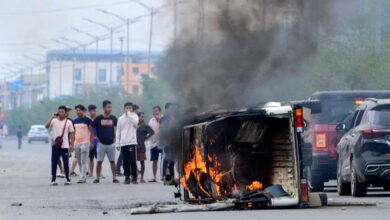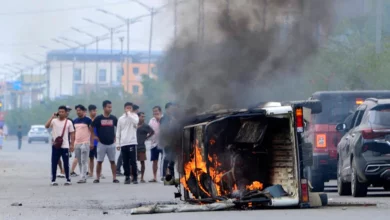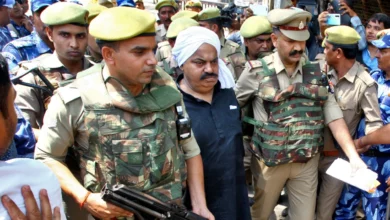When the government made the people pin their hopes on the Abu Qir power station for uninterrupted electricity supply, it was not aware that the new power station — soon to enter into service — would see yet another bloody incident where an Egyptian citizen would be killed by police following a confrontation between residents, who harassed the workers at the station, and the Interior Ministry.
That was not, by far, the first victim from clashes at the power station. Army forces killed three citizens in a similar confrontation when the residents barged into the station and attacked foreign laborer's lodgings. In yet another attack on the station, a number of the engineers at the station were injured.
The saga dates back to February 2011 when the power station was still under construction, and local residents attacked it to demand jobs for their children at this massive establishment, where dozens of contractors work and hire thousands of Egyptian and foreign workers.
That attack was among a spate of others that took place after the revolution, targeting power stations around the country to make the same demand. In the Abu Qir attack, the residents complained about the hiring of Chinese workers, who lived in housing in their neighborhood.
The residents were frustrated by power station managers who chose to import labor all the way from China, at the expense of their sons, prompting the management to heed their calls and hire them.
However, the newly hired workers from among the residents were not competent enough. In fact, their behavior was unprofessional and they failed to show any commitment to the work and production criteria compared to other Egyptian and foreign workers. The foreign contractors, who did not tolerate loss or negligence, were quick to dismiss them.
The dismissed workers and other residents responded by blocking the roads leading up to the power station and attacking it, firing at the contractors’ offices and specifically targeting the places where the Chinese workers assembled.
In the meantime, the Armed Forces, who had been summoned to the site, arrived. In the confrontations with the residents, three of the residents received deadly shots and the rest were forced out of the station. In the afternoon, soldiers arrested some of the residents and threatened them into handing over other suspects.
Even though the protesters later learned that the Chinese workers were prisoners who were forced to work at overseas Chinese companies for extremely meager pay, the residents continued to regularly attack the station and assault the workers, engineers and police over the past year and a half, causing the death of four residents and the injury of a number of workers.
Perhaps this true story can be turned into a unique epic drama that tells of exploitation, misery-bred violence and Egypt.
The Abu Qir power station, which Egypt’s rulers count on for covering the country's electricity supply gap, is besieged by angry residents who believe they have a right to be employed in it; a right they may only get through continuous harassment of its workers.
Abu Qir is a sad story of a state that blames its incompetence on a power station that may indeed ease the electricity crisis, yet fails to solve the power shortage crisis conclusively; of residents whose misery transforms them into unrelenting thugs prone to killing and imprisonment; and of Chinese prisoners forced to work in our poor country in conditions worse than those in Chinese prison cells while their employers aggrandize their profits; of massive companies making feeble deals with the poor residents to silence them; and of security that uses force to solve a crisis for which they see no other solution.
At a time when Egypt’s new president speaks of achieving social justice with love, bullets are fired to kill those whose misery forced them into thuggery, even when it led to their imprisonment or death.
The violent tale of Tarh al-Bahr’s villager and the power station in Abu Qir occurs as part of a series of similarly nasty episodes in Egypt over the span of the past few weeks. To name one such incident, we should recall the Ramlet Boulaq violence.
In the midst of the country’s lawlessness and disorder, the police killed residents in the Ramlet Boulaq settlement, whose inhabitants have been struggling to keep their land from being confiscated by the state and telecommunications tycoon and billionaire Naguib Sawiris, who owns the neighboring luxury Nile City Towers complex.
Like in Abu Qir, the Ramlet Boulaq tragedy tells of the strain between mega projects and the neighboring poor residents — a calamity exacerbated by the state’s incompetence and unwillingness to implement justice, while keeping law and order.
Amid this violence and bloodshed, calls for the restoration of security in the country are mounting.
The revolution, which they made us think has reached the presidential palace, is still unable to deal with the country’s poverty and crime. There is little sign that President Mohamed Morsy’s administration would honor its responsibility toward the country’s poor, marginalized groups while handling the social contradictions that drive people into crime and violence.
The revolution has yet to succeed in dismantling the state of corruption gripping the country, or raise the difficult questions that would prepare society for genuine sacrifices to provide for a safe life for everyone.
In the absence of bold and fair measures and without instilling hope in society, loose rhetoric on renaissance projects and social justice through love are but empty talk.
Akram Ismail is a columnist and member of the Socialist Popular Alliance Party.
This article has been translated by Dina Zafer.




